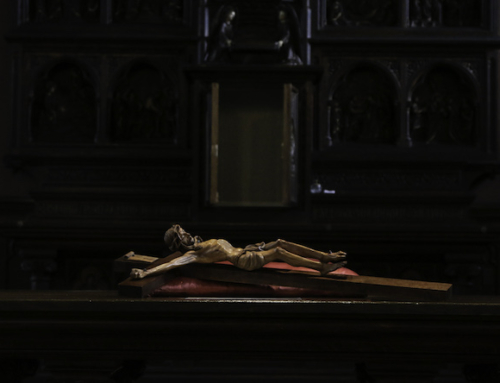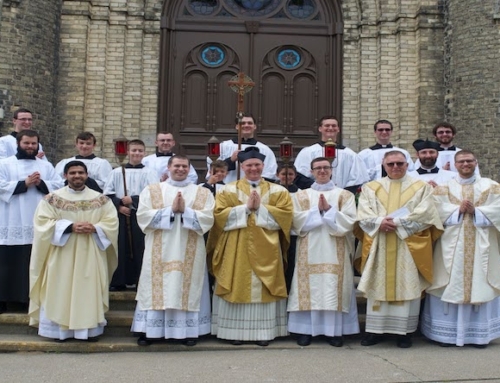Sed Contra: An Essay on the Modern Culture
A “sed contra” essay is to engage a cultural concern and to address it with the help of some philosophical or theological authority.
There is a not-so-new phenomenon making the rounds on the internet right now. People are posting videos promoting the “DINK” lifestyle (i.e., a couple with Dual Income, No Kids) (here or here). The concept is simple: DINKs choose a life where their money, time, and energy can be spent on the couple themselves, instead of diverting those resources to children. DINKs think that children would hinder their freedom and happiness.
It’s hard to tell if these acronyms and videos are ironic or sincere—my hunch is that they’re a bit of both. Many of the responses to these videos are bitter, calling DINKS “genetic dead ends.”
Frequently DINKs fire back in kind: “Breeders are miserable and want the rest of us to join them.”
With all the acidic mud-slinging, I suggest we follow charity and wisdom. Using a Christian viewpoint, I would like to give a word of truth about both sides arguing over the DINK phenomenon, for both the DINKs and the anti-DINKs.
First, the DINKs:
The couples choosing to avoid children are doing so to embrace something else that they perceive as more valuable and more desirable, as simply better… things like the unhindered freedom to do what they want, to travel as they please, to buy the food they want… in short, to not have their lives revolve around their children, but around their own needs and wants, hopes and aspirations.
Such reasoning misses the mark on account of goodness, love, and the wisdom of the cross.
- Goodness – The things DINKs choose in place of children do not equal a child’s value. If we could weigh these things on a “Goodness scale,” we would find that a child far outweighs extra vacations, sleep, snacks, cash, or rounds of golf. These things are sensible and material comforts…and for that reason, they are quite fleeting. Snacks last a few moments, golf a few hours, and vacations a few days or weeks. But a child is a rational person with an immortal soul. The goodness of a parent-child relationship lasts a lifetime. As time goes on, that relationship grows: from tickling infants, to playing with kids, teaching teenagers, being proud of budding adults, enjoying grandchildren, and being cared for in old age.
- Love – Because openness to children is essential to authentic marital love, to start a family is to enrich spousal love. The family is a “school of charity,” where we learn what it is to love. We discover that love is “not self-seeking” (1 Cor 13:5). Children draw parents out of themselves. By frequent repetition, parents learn how to be extensions of Christ’s sacrificial love for their children and each other (Eph 5:25).
- Wisdom of the Cross – Parenthood is one of the chief ways that God sanctifies husbands and wives. It makes them holy. That doesn’t mean it’s easy. As followers of Christ, we attain heaven through carrying our cross with Jesus (Heb 2:10). DINKs aren’t wrong to say that children are a burden or discomfort for their parents: children do in fact demand from their parents a sacrifice of love that does not count the cost. Without the Christian virtue of faith, we can only see this discomfort and suffering as foolishness (1 Cor 1:18). By faith, Catholic parents look upon these sufferings with love and not disdain. Through patiently loving their children, parents are conformed to the loving Savior, Jesus Christ, and Him crucified.
Second, something for the anti-DINKs to keep in mind:
While children are gifts, we must remember that the Giver is far greater. By taunting DINKs with predictions of a miserable future, an anti-DINK can fall into the error of turning children and parenthood into the highest goods of human life, forgetting that God is yet greater. Many married couples, through no fault of their own, do not have children (e.g., difficulty conceiving, miscarriages, tragedy). This fact does not relegate their marital life to mediocrity. Far from abandoning these marriages, God draws nearer to those who suffer. And, following the example of the Savior, there are many others who forego the good of a family and children altogether, for the sake of the kingdom of God (Matt 19).
Instead of online arguments, let’s enter into prayer with the Holy Family: Mary and Joseph, how was your married love enriched by welcoming Jesus into your home? Joseph, what did you sacrifice to care for Mary and Jesus? Jesus, how much did you love your parents?
✠
Image: Alberto Casetta, Man, Woman, and Child Walking Together Along Dirt Road (used with permission)







